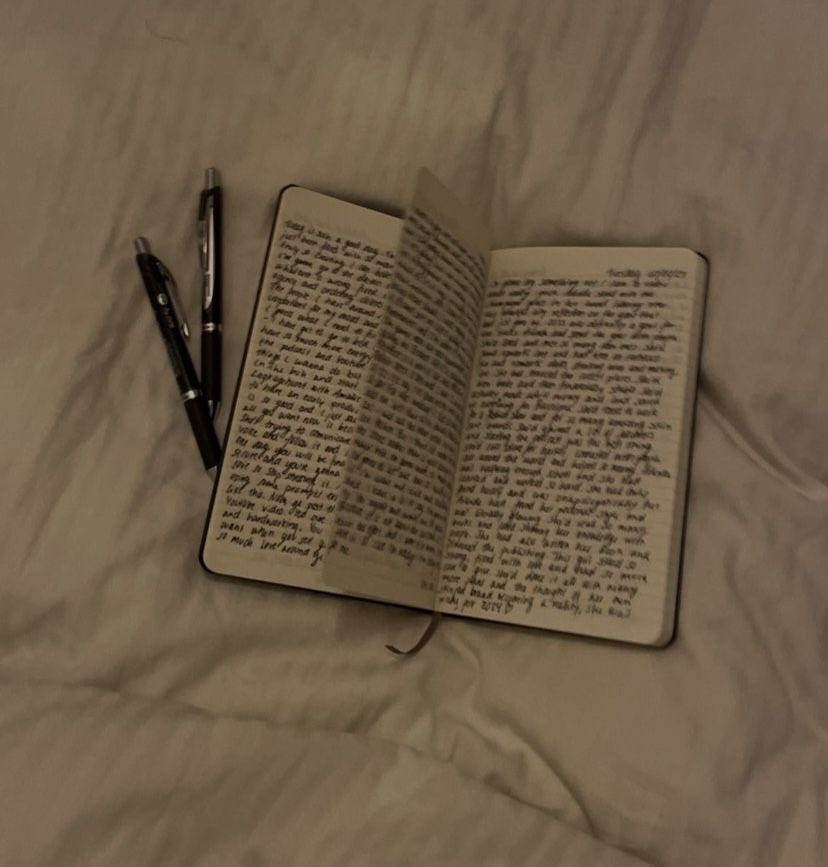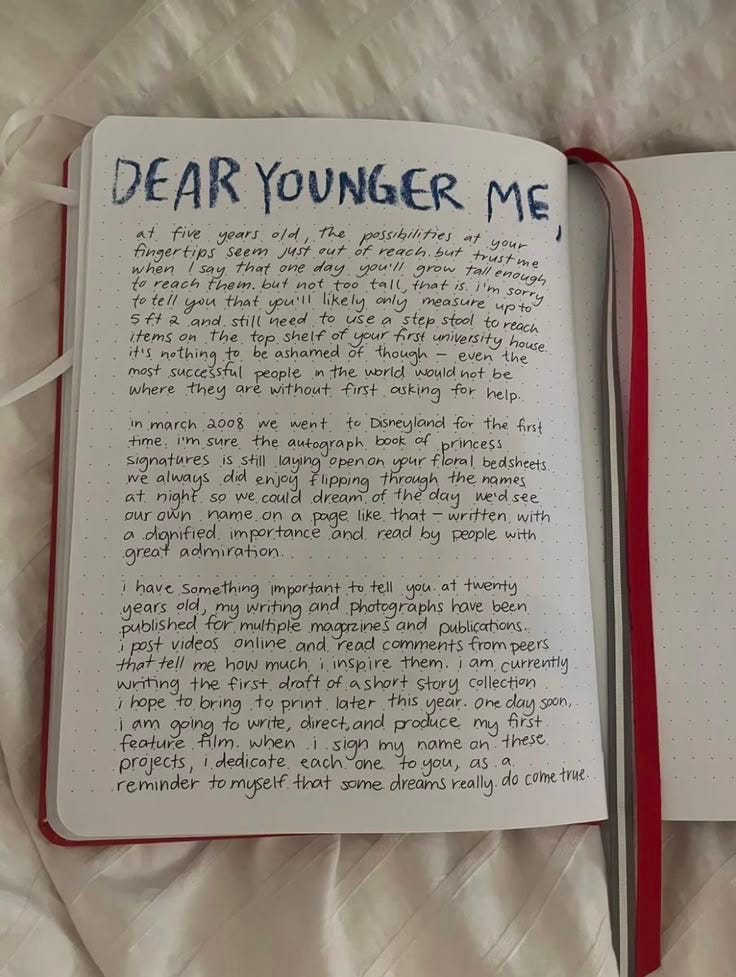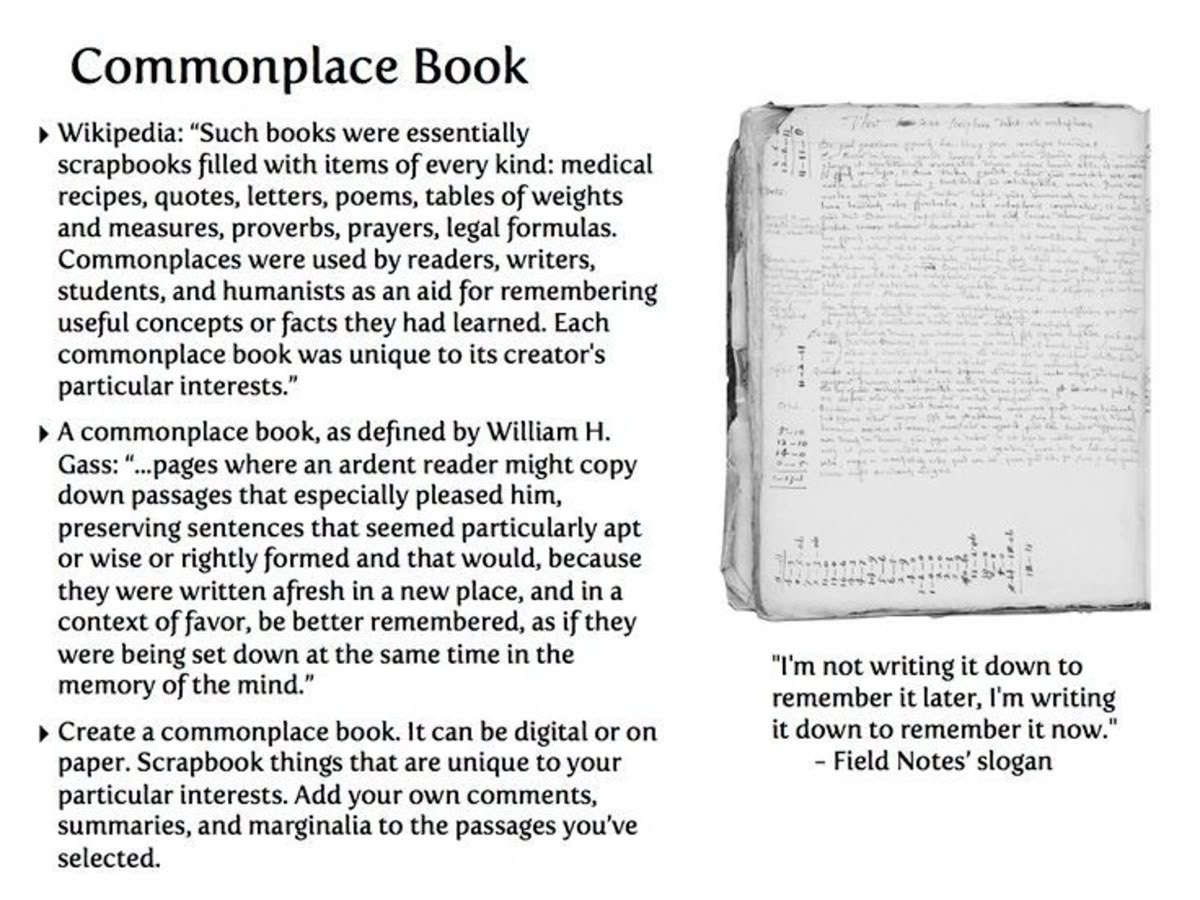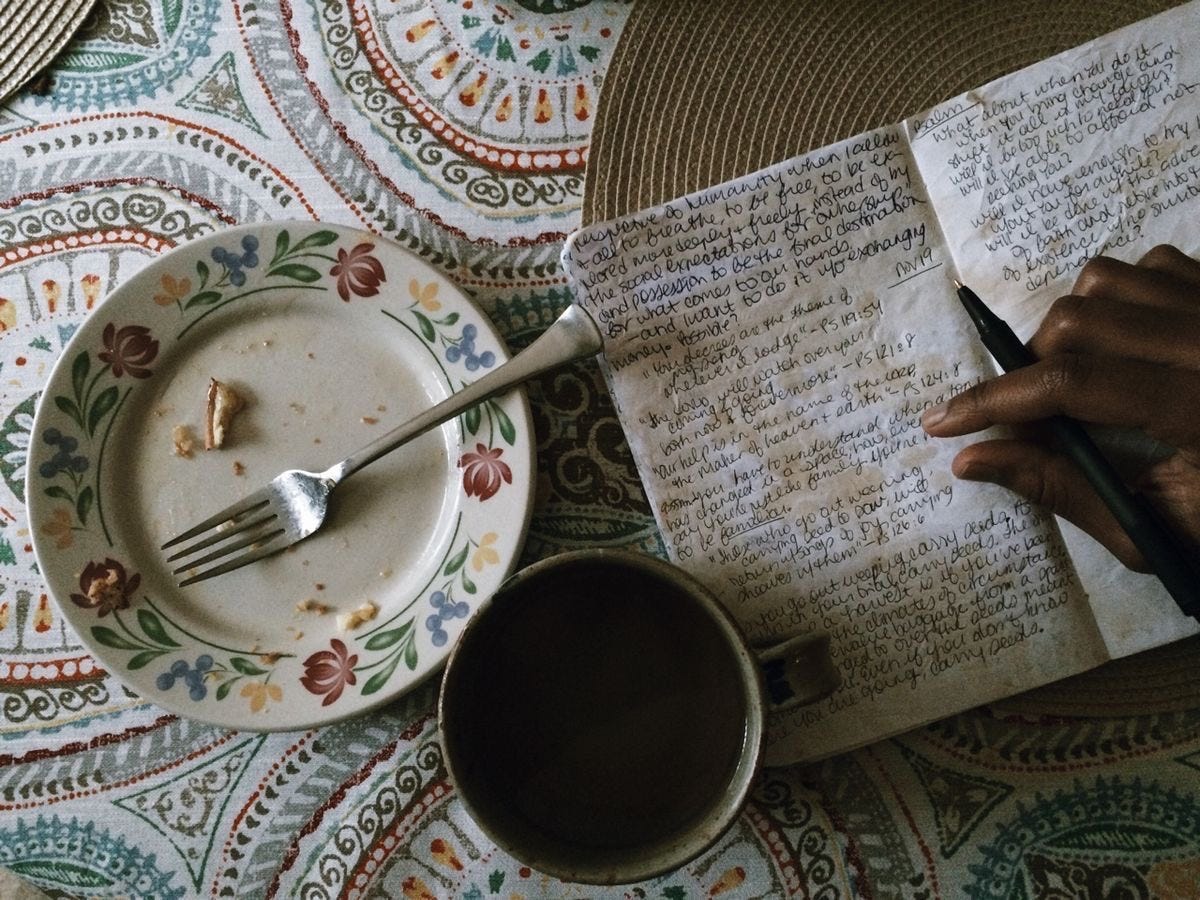how to journal when your mind feels like a mess
there’s a quiet kind of companionship in putting pen to paper. the kind that doesn’t interrupt you, doesn’t rush you, doesn’t ask for clarity or polish. just presence. a journal, after all, asks for nothing more than your honesty. it doesn’t care if you ramble or repeat yourself. it simply holds space.
i used to think journaling was a productivity habit. the kind of thing high-functioning people did first thing in the morning, next to a lemon water and a structured day ahead. now i know it’s more like a soft return—to yourself. a way to slow down the spinning wheel inside your head and notice what’s actually there. a place to feel without performing.
if you’ve ever wanted to start journaling but didn’t know where to begin—or if you’ve started and stopped a dozen times—you’re not alone. this essay is for anyone curious about journaling: how it works, why it matters, and all the quiet, surprising ways it can change your inner landscape.
this is not a how-to in the strict sense. it’s a gentle invitation. a layering of history, science, and story. a case for making time to sit with yourself.
the invisible architecture of our thoughts
many great thinkers wrote not for an audience, but for themselves. marcus aurelius never meant for his journal to be read by others—meditations was simply his way of staying sane and moral in the chaos of being emperor. virginia woolf scribbled loose, stream-of-consciousness entries into her diary, believing a journal should “embrace anything… solemn, slight or beautiful.” joan didion wrote in notebooks not to record facts, but to capture how it felt to be her. carl jung kept the red book, an intense visual and written journal through which he explored his unconscious, saying those years of writing were “the most important time of my life.”
what all these people shared was not just the act of writing, but the way writing became a mirror. a method of watching their thoughts shape themselves. a way to step outside the noise and notice the pattern.
and while the act of journaling might seem quiet—soft, even—it’s anything but passive. neuroscience now tells us that expressive writing lights up the brain like a small firework show. it activates both hemispheres, strengthens memory pathways, and, over time, actually rewires how we think and feel. one study even found that journaling about emotions lowers activity in the brain’s fear center (the amygdala), and increases regulation from the prefrontal cortex—the part that helps us make wise, calm decisions.
so when we say journaling clears the mind or helps us process emotions, it’s not metaphor—it’s measurable. writing thoughts down literally changes how the brain handles them.
journaling is for everyone
the thing is, you don’t have to be a writer to keep a journal. you don’t need fancy prompts, a perfect routine, or a leather-bound notebook. you just need to show up. regularly, or not. with clear thoughts, or none at all.
journaling is for the overthinker who needs to untangle their day. it’s for the sensitive soul who doesn’t always say what she’s feeling out loud. it’s for the person healing from something unspoken, or someone in transition. it’s for the dreamer, the planner, the skeptic. it’s for anyone who wants to be a little more awake to their own life.
how journaling meets you where you are
you might be wondering: okay, but what do i write about?
there’s no one way, and that’s the best part. below are different styles of journaling you can try, depending on your mood, mindset, or curiosity:
1. stream of consciousness
write without stopping. no grammar, no censoring. just let the thoughts tumble out. you might write, “i have no idea what to say” for two pages before something real sneaks through. it’s like opening a window in a dusty attic—air flows in eventually.
2. morning pages
coined by julia cameron, this practice involves writing three longhand pages each morning. it clears mental clutter and helps access creativity. no agenda—just flow.
3. gratitude journaling
each day, jot down three things you’re grateful for. they can be small (good coffee, a text from a friend) or huge (health, safety). this rewires your brain to look for what’s going right.
4. reflective prompts
try prompts like:
what do i need more of right now?
what am i afraid to admit?
what do i wish someone told me when i was younger?
what am i pretending not to know?
5. unsent letters
write to someone you’re not ready (or able) to talk to—an ex, a parent, your younger self, even your anxiety. say what you need to say, then decide whether to keep, burn, or forget it.
6. list journaling
if you’re short on time, try simple lists:
things that made me smile today
things that drained me
songs i’m listening to
things i’m craving (emotionally or literally)
different journals for different parts of you
beyond the how, there’s also the where. here are beautiful, varied types of journals that reflect different corners of the self:
– personal diary: the classic. use it to process your day, your emotions, or your dreams. the most familiar and forgiving form.
– commonplace book: collect quotes, lyrics, lines from books, ideas worth keeping. a living archive of your intellectual and emotional obsessions.
– dream journal: record what you remember right after waking. dreams are weird but meaningful—they can reveal your subconscious at play.
– travel journal: for capturing impressions from places you visit. sensory details, conversations, little maps and mementos. makes a memory into a story.
– sketch journal: not everything needs words. draw, doodle, make little visual records of what you’re noticing or feeling.
– idea log / creativity journal: a brain-dump space for business ideas, captions, workshop titles, product concepts, or half-thought poems.
– bullet journal: a hybrid planner-diary for the organized dreamer. habit trackers, goals, gratitude logs, and reflections, all in one space.
– nature journal: record what you see outside. it teaches you to slow down and observe the world. a quiet ritual of seasonal presence.
– spiritual or prayer journal: a place to write to something bigger. letters to god, the universe, or simply your wiser self.
– digital vs. analog: no need to choose. some people love the romance of pen and paper. others love searchable digital notes. both are valid, and can co-exist.
it’s not about being good. it’s about being honest.
the goal isn’t to be eloquent. it’s to be real. your journal is not a performance. it’s not a place to be impressive. it’s where you go to be messy, incoherent, repetitive, confused, joyful, angry, scared, or brilliant—whatever you are that day.
as virginia woolf said, “i write to soothe the relentless questioning of my mind.” and often, what starts as a swirl of frustration becomes clarity by the last paragraph. that’s the magic of journaling: the beginning is often chaos, but the end tends to feel like exhale.
starting is simple
you don’t need a 10-step plan. just a blank page and a few quiet minutes. here are some gentle prompts to begin:
today, i feel…
something i’m trying to understand is…
lately, i’ve been thinking about…
i wish i could tell someone…
i’m grateful for…
i need to let go of…
pick one. write one sentence. then another.
don’t worry about sounding wise. don’t worry about what it looks like. don’t worry if you skip a day, or a week. your journal will be there when you return.
a final thought
in a world where we’re constantly performing, journaling is one of the few spaces where you don’t have to. and maybe that’s the radical act. not the writing itself, but the honesty it allows. the way it lets you meet yourself again and again in quiet clarity.
so light a candle. open the page. take a breath.
and begin.










Thank you for this article, it made me want to grab my journal asap. Journaling is a precious date with yourself and an opportunity to fall in love with your authentic self.
this is such a timely post for me! i recently got into substack and been reading a lot of good quotes/essays. and im writing it to my planner everyday (im on my 3rd day!)